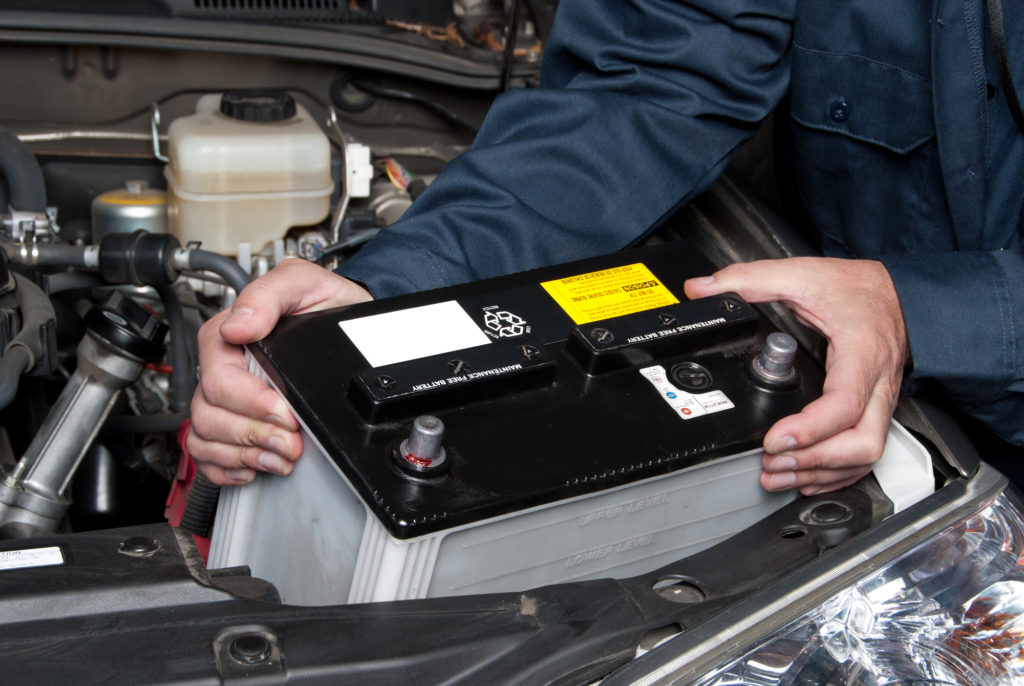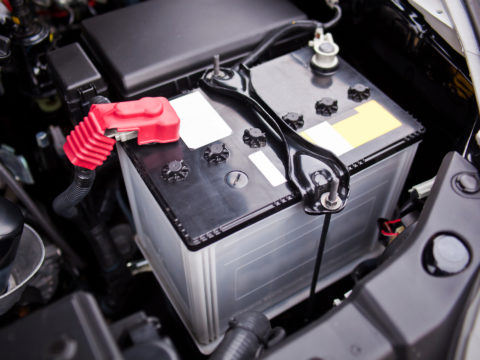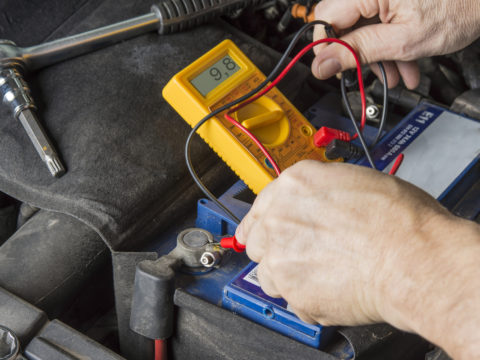Car batteries are integral for the proper function of any vehicle, whether it uses a combustion engine or an electric motor. But how does weight impact a car battery? Read on to find out how much different car batteries weigh as well as why battery weight is essential.

Contents
Why Is the Car Battery Weight Important?
The weight of a car battery often correlates to its power capacity. Each type of vehicle has a minimum amount of power needed to function efficiently. If you get a battery that doesn’t have enough power for, say, a semi-truck, your semi won’t operate at maximum output. Knowing the weight of a car battery helps you choose the most efficient battery for your vehicle.
How to Confirm Car Battery Weights
There are generally three ways to confirm your battery’s weight—read the packaging, check your car owner’s manual, or use a scale. By reading the packaging or owner’s manual, you’ll get the most accurate weight, but using a scale is accurate enough to get by.
Average Weights of Typical Car Batteries
Instead of giving you the average weight of car batteries in general, we’re going to go through some common battery types and their average weights.
How Much Does a Standard Car Battery Weigh?
We usually define a standard car battery as a 12-volt lead-acid battery. This type of battery is the most common battery seen in cars in North America. A standard battery has six 2.1-volt cells and weighs 41 pounds, on average.
How Heavy is a 12-Volt Car Battery?
12-volt car batteries aren’t always made with lead-acid components, though. Manufacturers made some batteries with lithium-ion, which is more expensive than lead-acid. Lithium-ion 12-volt batteries usually weigh 26 pounds. Alternatively, lead-acid 12-volt car batteries weigh 41 pounds.
How Much Does a Lithium-Ion Car Battery Weigh?
As stated before, lithium-ion batteries weigh approximately 26 pounds each. Some lithium-ion batteries that have more amp hours weigh more, but the average weight of lithium-ion batteries is 26 pounds.
How Much Does an Electric Car Battery Weigh?
Electric car batteries do more than start your car and stabilize the voltage of your car. Electric car batteries also form the main energy source for electric vehicles. That means electric car batteries can vary from model to model.
For example, the nickel lithium-ion battery in a Chevy Bolt weighs 947 pounds, while the Mustang Mach E’s battery weighs more than 1000 pounds. The weight of an electric car’s battery depends on the size of the car. The bigger the car, the larger and heavier the battery.
How Much Does a Hybrid Car Battery Weigh?
Hybrid cars have two batteries—a standard 12-volt starter battery, as well as an electric battery it can pull energy from. The starter battery could be lead-acid or lithium-ion, meaning its weight could be either 26 or 41 pounds, on average.
The electric battery is much heavier, but like other electric car batteries, it differs from model to model. For example, the hybrid Toyota Prius has a rechargeable that weighs 118 pounds. Another hybrid, the Honda Accord, has a battery that weighs about half that.
How Much Does a Group 35 Car Battery Weigh?
Japanese cars, like Toyotas and Subarus, are the most likely type of car you’ll find a Group 35 car battery in. Group 35 car batteries are usually lead-acid, 12-volt batteries that range between 44 and 66 amp-hours. On average, Group 35 car batteries weigh 42 pounds.
Semi-Truck Battery Weight
Semi-trucks require the same batteries as a smaller vehicle; the difference is the number. Instead of just one 12-volt starter battery, semis need two or four wired in series to produce enough power to start and maintain the vehicle.
The size and number of batteries also impact amp-hours or hours of power at a certain voltage level. Usually, semi batteries have a total of 100 to 180 amp-hours. The total weight of the batteries in a semi weighs between 66 and 123 pounds.
How Much Does a Heavy-Duty Car Battery Weigh?
A heavy-duty car battery is a car battery that can handle immense amounts of work while not becoming damaged while doing so. You’ll find heavy-duty car batteries in buses, large trucks, tractors, and other vehicles that need strong batteries.
Heavy-duty batteries vary in size and weight. For example, tractor batteries weigh between 25 and 60 pounds, while bus batteries weigh between 130 and 190 pounds.
How Much Does a Tesla Car Battery Weigh?
As an electric car brand, Teslas only have one battery that holds the power to start and propel the vehicle. The battery is made from thousands of individual lithium-ion batteries. Tesla car batteries weigh 900 pounds on average.
How Much Does a Ford Battery Weigh?
The Ford F-150 is the most popular vehicle in North America, with almost 900,000 sold in the United States in 2019. Ford F-150’s use a standard 12-volt battery and they weigh 41pounds, on average. Other Ford models use the same battery unless they’re an electric vehicle.

Factors That Contribute to Variations in Car Battery Weights
Certain factors contribute to a car battery’s weight. First and foremost, the contents of the battery are heavy. Lead is a heavy element that adds a lot of weight to the battery. That’s why other batteries are often much lighter.
The dimensions of the battery also add weight. A battery with more cells will have more materials, thus causing it to weigh more. Whether or not the battery is fully charged also affects the weight. A depleted battery weighs less than half of what a full battery weighs.
Other factors include:
- Weather resistance
- Use of plastic
- Number of batteries (for electric cars)
Wrapping Up
Now that you know how much different car batteries weigh, you can go and choose the best one for your car. If you can’t remember the weight of your current battery, check the owner’s manual. That way you can ensure you get a battery that will function efficiently in your vehicle.














